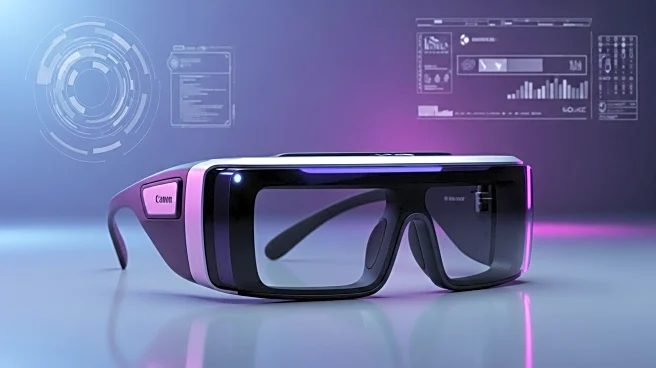What is the story about?
What's Happening?
Major technology companies are gearing up to release advanced augmented reality (AR) glasses by 2025, aiming to transition AR from a niche technology to a mainstream consumer product. Meta has recently unveiled new smart glasses featuring a display and wrist controller, while Amazon is developing its 'Jayhawk' AR glasses, expected to launch between 2026 and 2027. Apple has patented adaptive-vision lenses, which could offer on-the-fly vision correction. These developments are part of a broader trend where companies are moving from prototype demonstrations to consumer-ready features, such as full-color displays and integrated AI. The market for AR/VR devices is projected to grow by 39.2% in 2025, indicating a significant increase in consumer adoption.
Why It's Important?
The introduction of consumer-friendly AR glasses could revolutionize how people interact with technology, offering new ways to integrate digital information into daily life. This shift could impact various sectors, including retail, healthcare, and entertainment, by providing immersive experiences and practical applications. Companies like Meta, Amazon, and Apple are positioning themselves to capture a share of this emerging market, potentially leading to increased competition and innovation. Consumers stand to benefit from a wider range of choices and improved technology, while businesses may find new opportunities for engagement and revenue.
What's Next?
As these AR glasses approach their release dates, consumers can expect more detailed announcements regarding features, pricing, and availability. The competition among tech giants is likely to intensify, with each company striving to offer unique selling points. Stakeholders, including developers and retailers, will need to adapt to the new technology landscape, potentially leading to new business models and partnerships. The success of these products will depend on consumer acceptance and the ability of companies to address privacy and usability concerns.
Beyond the Headlines
The development of AR glasses raises questions about privacy, data security, and the ethical use of technology. As these devices become more integrated into daily life, there will be increased scrutiny on how data is collected and used. Additionally, the cultural impact of AR technology could lead to shifts in social interactions and the way people perceive reality. Long-term, the widespread adoption of AR could influence urban planning, education, and workplace environments, as digital overlays become a common feature of the physical world.














